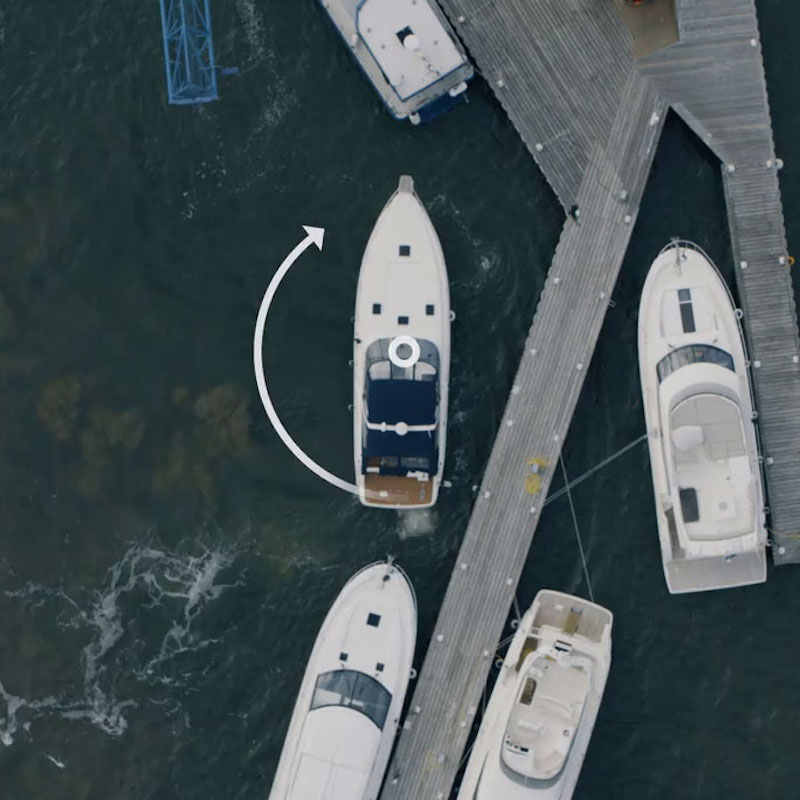
Volvo Penta launches autonomous boat docking system
Volvo Penta has launched what it describes as “the industry’s first fully integrated Assisted Docking system” at the Consumer Electronics Show (CES).
Volvo says the Assisted Docking system gives the captain better control when docking a boat by automating his or her intentions, compensating for some dynamic variables, such as wind and current, and helping the vessel stay on its intended course.
The technology will be on display at Volvo Penta’s virtual booth at CES from 11-14 January 2021.
Docking can be one of the most stressful and challenging aspects of boating – even for experienced captains. The consequences of getting it wrong when you are docking a boat are expensive, at best – and that is in fair weather.
Add crowded marinas, strong winds, and rough currents and the outcome can be problematic and even quite dangerous. Unlike a car, a boat never stands still without some maneuvering required. And moving in a straight line, into a narrow berth in foul weather is much more difficult than steering the wheel of a car.
But Volvo Penta has now taken its joystick-docking technology and easy boating solutions to the next level in its continued efforts to make docking a less stressful endeavor.
The Assisted Docking system integrates a software layer developed in house with the company’s GPS-based Dynamic Positioning System and proprietary Inboard Performance Systems (IPS) for a complete package including HMI (human-machine interface) at the helm, electronics via the engine, propulsion systems and sensors, and advanced navigation processing power for a much easier boating experience, even in rough conditions.
Anders Thorin, product manager electronics at Volvo Penta, says: “When we launched our joystick technology in 2006, the maneuvering and control functionality it brought to leisure boating shook up the marine industry – delivering game-changing innovation is in our DNA.
“From our Electronic Vessel Control (EVC) system, which connects and manages the internal communications between the engine and driveline, joystick and display screen so the driver can control everything from the joystick – to our Dynamic Positioning System (DPS), which automatically maintains a boat’s heading and position, even in rough conditions – to today with the release of the Assisted Docking system, we take the next step in easy boating and continue our long-held ambition to make docking a boat easier for a more enjoyable boating experience.”
Ida Sparrefors, director of autonomous solutions and new business models at Volvo Penta, says: “Assisted Docking is a hybrid between automated docking and manual docking.
“Even though, in some ways, it would have been easier to implement full automation, the beauty of this system is that it gives the captain enhanced control. With our team of experts – from software developers to test drivers – we have made it behave intuitively in all situations, so that anyone can feel like a seasoned captain.”
The Assisted Docking system will be available in spring 2021 for installation on new boat models, as an upgradeable option for Volvo Penta IPS-equipped motor yachts sized 35ft to 120ft long, and as a retrofit – which will require a software upgrade and new antenna – for existing Volvo Penta IPS-powered boats. The Assisted Docking system will be sold directly to original equipment manufacturers.
Thorin says: “Our aim has long been to make things easier for our existing customers and to attract more people to enjoy the boating experience.
“Current Volvo Penta customers will be able to enjoy the Assisted Docking system with a relatively simple update, which can be performed by a local dealer. For those new to boating, it will be the first step into the world of modern boating and, we hope, the first of many new adventures to come.”
In 2018, the company unveiled its self-docking yacht prototype via a live demo event at the Volvo Ocean Race in Gothenburg, Sweden. Since then, Volvo Penta has been evolving and testing the concept with its research and development team.
Thorin says: “We are really in a unique position at Volvo Penta.
“Most specialist technology R&D requires only external input, but we have a team of software developers in-house. They know the products – in fact, they helped design the DPS and more – they know what boaters want and they know how to integrate the software to deliver the perfect experience.”
